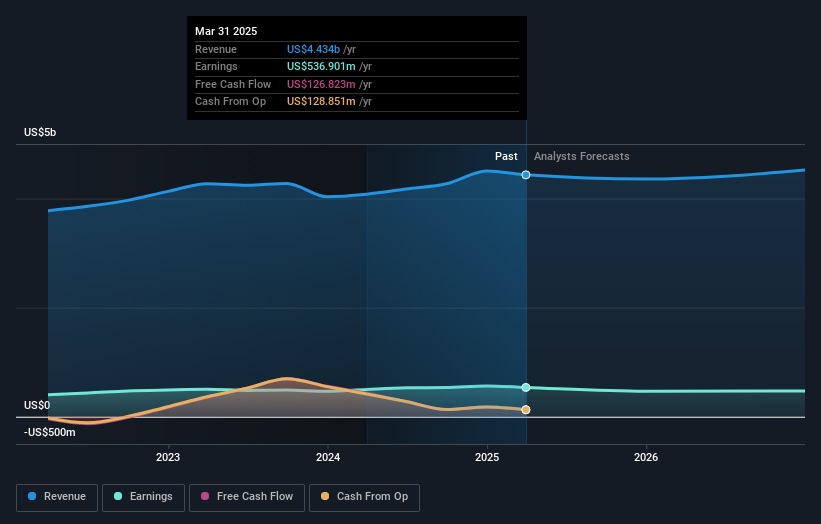Earnings Report: M/I Homes, Inc. Missed Revenue Estimates By 13%
The analysts might have been a bit too bullish on M/I Homes, Inc. (NYSE:MHO), given that the company fell short of expectations when it released its first-quarter results last week. M/I Homes reported an earnings miss, with US$976m revenues falling 13% short of analyst models, and statutory earnings per share (EPS) of US$3.98 also coming in slightly below expectations. The analysts typically update their forecasts at each earnings report, and we can judge from their estimates whether their view of the company has changed or if there are any new concerns to be aware of. With this in mind, we've gathered the latest statutory forecasts to see what the analysts are expecting for next year.
We've discovered 2 warning signs about M/I Homes. View them for free.
Following last week's earnings report, M/I Homes' three analysts are forecasting 2025 revenues to be US$4.36b, approximately in line with the last 12 months. Statutory earnings per share are expected to sink 15% to US$17.00 in the same period. In the lead-up to this report, the analysts had been modelling revenues of US$4.78b and earnings per share (EPS) of US$18.44 in 2025. It's pretty clear that pessimism has reared its head after the latest results, leading to a weaker revenue outlook and a small dip in earnings per share estimates.
View our latest analysis for M/I Homes
It'll come as no surprise then, to learn that the analysts have cut their price target 5.6% to US$159. Fixating on a single price target can be unwise though, since the consensus target is effectively the average of analyst price targets. As a result, some investors like to look at the range of estimates to see if there are any diverging opinions on the company's valuation. Currently, the most bullish analyst values M/I Homes at US$185 per share, while the most bearish prices it at US$140. Even so, with a relatively close grouping of estimates, it looks like the analysts are quite confident in their valuations, suggesting M/I Homes is an easy business to forecast or the the analysts are all using similar assumptions.
Of course, another way to look at these forecasts is to place them into context against the industry itself. These estimates imply that revenue is expected to slow, with a forecast annualised decline of 2.3% by the end of 2025. This indicates a significant reduction from annual growth of 9.1% over the last five years. By contrast, our data suggests that other companies (with analyst coverage) in the same industry are forecast to see their revenue grow 4.4% annually for the foreseeable future. So although its revenues are forecast to shrink, this cloud does not come with a silver lining - M/I Homes is expected to lag the wider industry.
The Bottom Line
The biggest concern is that the analysts reduced their earnings per share estimates, suggesting business headwinds could lay ahead for M/I Homes. On the negative side, they also downgraded their revenue estimates, and forecasts imply they will perform worse than the wider industry. The consensus price target fell measurably, with the analysts seemingly not reassured by the latest results, leading to a lower estimate of M/I Homes' future valuation.
Following on from that line of thought, we think that the long-term prospects of the business are much more relevant than next year's earnings. At Simply Wall St, we have a full range of analyst estimates for M/I Homes going out to 2026, and you can see them free on our platform here..
You should always think about risks though. Case in point, we've spotted 2 warning signs for M/I Homes you should be aware of, and 1 of them is potentially serious.
Have feedback on this article? Concerned about the content? Get in touch with us directly. Alternatively, email editorial-team (at) simplywallst.com.
This article by Simply Wall St is general in nature. We provide commentary based on historical data and analyst forecasts only using an unbiased methodology and our articles are not intended to be financial advice. It does not constitute a recommendation to buy or sell any stock, and does not take account of your objectives, or your financial situation. We aim to bring you long-term focused analysis driven by fundamental data. Note that our analysis may not factor in the latest price-sensitive company announcements or qualitative material. Simply Wall St has no position in any stocks mentioned.
 Wall Street Journal
Wall Street Journal